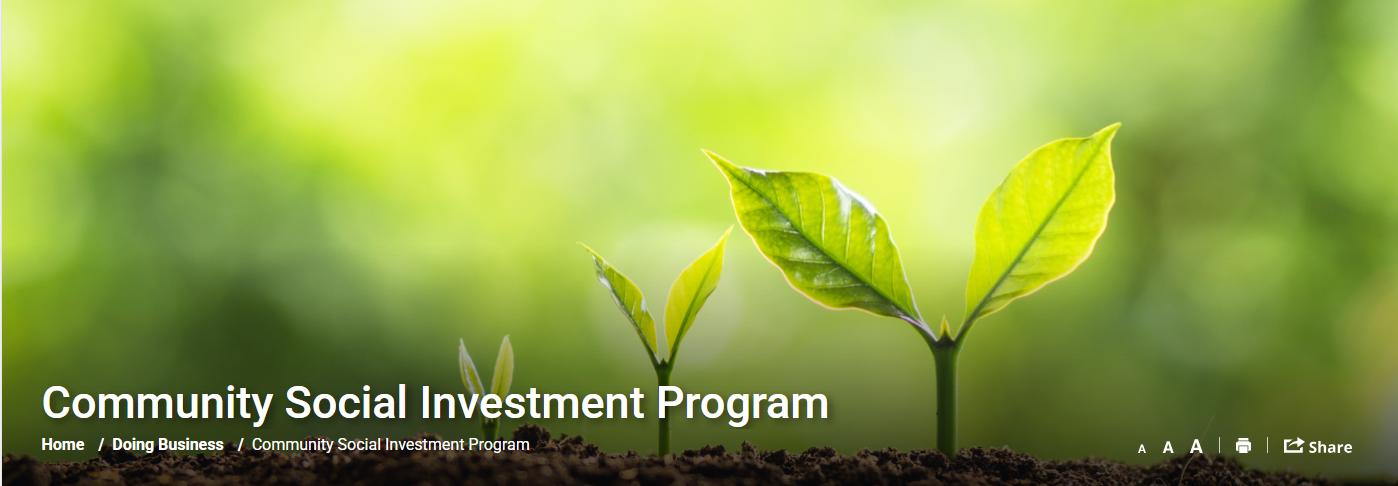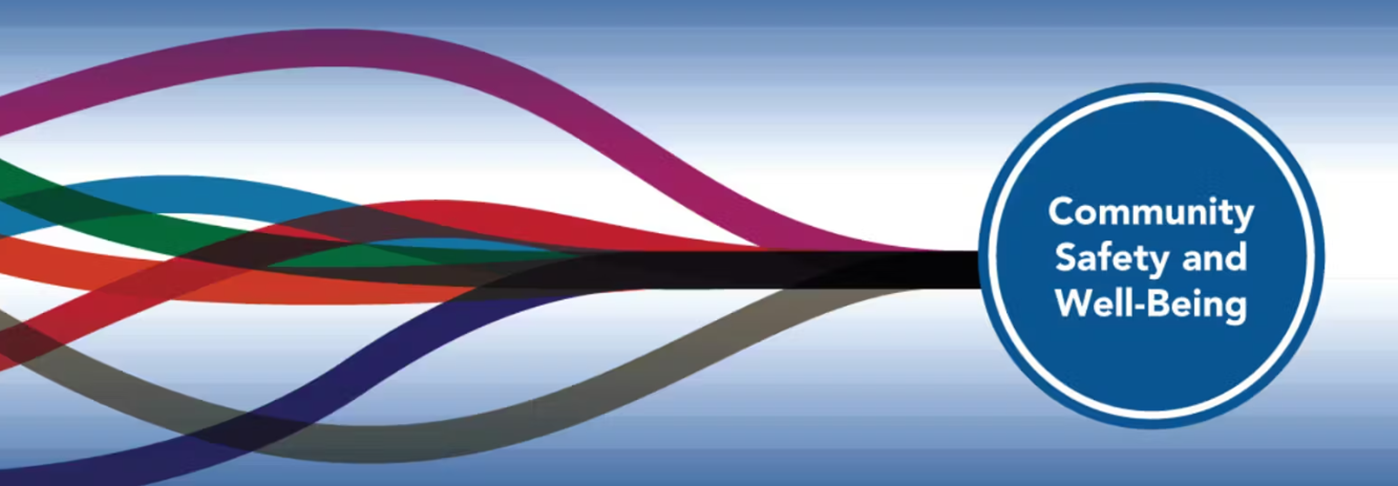
Funding Resources
Community organizations work hard to respond to the needs of the community and funding initiatives to help to support this work are available from many sources, including the federal and provincial governments, business and other funding organizations. This page will post funding opportunities that may be of interest to local organizations and other resources that can help in the application process.
Questions? A series of frequently asked questions and answers is at the bottom of the page.
Find Tips for Writing Grant Applications and helpful Data Sources for Grant Applications.
Durham Region Funding Programs
 Learn about funding available through the Community Social Investment Program.
Learn about funding available through the Community Social Investment Program.
 Learn about funding available through the Community Safety and Well-Being Plan.
Learn about funding available through the Community Safety and Well-Being Plan.
Local Funders and Community Organizations
Grant Connect
Grant Connect: is an online fundraising research platform designed by Imagine Canada to help Canadian charities, nonprofits, and community organizations identify, research, and connect with potential funders. Durham Community Foundation is pleased to provide charities and non-profit organizations based in the Region of Durham and Northumberland County with the community license to Grant Connect.
With Grant Connect, you have access to:
- Over 11,400 Canadian foundations, 500 corporate giving programs, 500 government grant programs, 80 American foundations, and 250 other kinds of grant opportunities.
- Funder profiles that offer insights on specific grant programs, application preferences, financial summaries, and key decision-makers.
- Data on billions of dollars in past donations, categorized by size, cause, population, and region.
- Targeted search filters that help you quickly find the right funder for your charity by gift size, deadline, and type of support.
Learn more about accessing Grant Connect through Durham Community Foundation.
211 Durham
Learn more at durham.211central.ca or call/chat/text/email 2-1-1.
Funding Opportunities Update e-Newsletter
The Funding Opportunities Update is a bi-monthly e-newsletter that provides information about upcoming grants, funders and funding deadlines. You can find links to the most current issues below.
The updates are not exhaustive lists of funding opportunities and should not preclude you investigating funding opportunities on your own. If you find a grant that you think should be added to the list, please let us know by emailing funding@durham.ca.
Current Issue
Funding Opportunities Update: January 2026: This update includes upcoming funding opportunities with deadlines for applications.
Sign up to receive the Funding Opportunities Update by emailing funding@durham.ca.
Current Funding Opportunities
The current funding opportunities listed below opened after the most current Funding Opportunities Update was released and so were not included in the e-newsletter.
Government of Canada: Enabling Accessibility Fund
This funding opportunity aims to make workplaces and communities across Canada more accessible for persons with disabilities. It will fund projects that create more opportunities for persons with disabilities to access and maintain employment. In addition, it will fund projects that remove accessibility barriers for persons with disabilities in Indigenous workplaces or Indigenous communities.
This CFP will provide up to $12 million in funding. Projects will be funded for a maximum duration of 24 months. Eligible organizations can apply for funding between $500,000 and $1,000,000 and may only submit one application per unique Canada Revenue Agency (CRA) Business number.
Application Deadline: March 12, 2026
Government of Canada: Indigenous Early Learning and Child Care - Quality Improvement Projects
The Indigenous Early Learning and Child Care (IELCC) Quality Improvement Projects (QIP) stream supports projects that improve the quality, accessibility, and cultural relevance of early learning and child care services for Indigenous children by using Indigenous knowledge, improving training for educators, and creating tools that reflect Indigenous cultures and languages. Eligible organizations can apply for up to $2 million for projects that can last up to 36 months.
Application Deadline: March 25, 2026
Government of Canada: Workplace Opportunities - Removing Barriers to Equity
Workplace Opportunities: Removing Barriers to Equity (WORBE) is a grants and contributions program. WORBE is designed to support employers subject to the Employment Equity Act (the Act) in their efforts to improve designated group representation in areas of low representation through partnerships and industry-tailored strategies.
Application Deadline: February 13, 2026, 2026
Government of Canada: The Workplace Harassment and Violence Prevention Fund
The Workplace Harassment and Violence Prevention Fund (WHVPF) is a grants and contributions program. WHVPF will invest in projects that will create safer workplaces for federally regulated employees. Through this funding, partner organizations will receive funding to co-develop sector-specific tools and resources that address these workplace issues. Approaches could include behavioural changes, education and guidance, to ensure the physical and psychological health and safety of employees.
Application Deadline: February 13, 2026, 2026
Home Depot Canada Foundation: Youth Opportunity Grant
The Home Depot Canada Foundation is committed to preventing and ending youth homelessness in Canada. We offer grants for youth-focused programs expanding stable housing, job readiness, and wrap-around support.
The Youth Opportunity Grants will consider applications from Canadian registered charities dedicated to preventing and ending youth homelessness in Canada through housing, prevention and employment programs. Including housing transformation, healthy pathways (prevention), and youth innovation, which include youth-led initiatives and education programs. Maximum Grant is up to $75,000.00.
The Home Depot Canada Foundation is committed to taking action on youth homelessness by supporting the housing needs of Canada’s youth. As such, preference is given to projects that support the development of affordable housing and community improvement projects that benefit homeless youth. Eligible projects include small-scale affordable housing and neighbourhood improvement projects that involve rebuilding, repairing, painting, refurbishing, landscaping and planting.
Application Deadline: March 6, 2026
ICD-RBC Foundation Scholarship Opportunity for Non-Profits
Help enable underrepresented organizations to elevate their governance oversight.
The Institute of Corporate Directors invites you to apply for the ICD-RBC Foundation Scholarship. The goal of this scholarship is to enable underrepresented organizations to elevate their governance oversight.
If you are a board director or Executive Director of a registered charity whose purpose is to improve outcomes for the community the organization serves, then the ICD invites you to apply to the ICD-RBC Foundation Scholarship.
This needs-based financial assistance will provide the opportunity to attend the ICD-Rotman Governance Essentials Program.
As Canada's leading program for foundational board governance education, participation in the program will provide high-level training, expanded leadership capabilities and insights from other community minded leaders.
Applications are considered on the basis of merit, need and factor in how governance education will benefit the registered charity.
Preference is given to equity-seeking organizations that serve the underrepresented.

*Each RBC funded scholarship is valued at $2500. Selected recipients are responsible for taxes and any out of pocket expenses.
Application Deadline: No posted deadline
Ontario Trillium Foundation: Capital Grants
Capital grant applications open February 4
Non-profit organizations in Ontario can apply for Capital grants from February 4, to March 4, 2026, at 5:00 p.m. ET. These grants fund projects that update buildings, enhance physical spaces, or purchase fixed and non-fixed equipment so people and communities can thrive. Apply for $10,000 up to $200,000.
- Coaching calls are available to discuss your project with an OTF Program Manager. Book a 20-minute coaching call today.
- Learn about Capital grant application requirements during a webinar. Register for a Capital grant webinar
Application Deadline: March 4, 2026
Region of Durham: Community Social Investment Program (CSIP)
CSIP: Sustainable Food Security Fund
In Durham Region, one in four households is currently experiencing food insecurity. Through the Sustainable Food Security Fund (SFS), the CSIP aims to address food insecurity in Durham Region and support sustainable solutions. This funding stream is designed to support innovative projects that enhance the sustainability and resilience of our local food security sector. Recognizing the critical role of existing community food programs, funding will focus on initiatives that promote long-term, sustainable solutions to improve food security for residents.
2026 Application Dates: Organizations whose proposed activities are primarily focused on food access, food systems, or food security are encouraged to note that the Sustainable Food Security (SFS) Fund will be launching on May 4, 2026. The SFS Fund is designed to support sustainable, long‑term food security initiatives and may be a better fit for projects where food security is the primary focus. Additional details will be shared closer to the SFS launch date.
CSIP: Thriving Communities Fund
In Durham Region, approximately 5.2% of residents live in poverty. Through the Thriving Communities Fund, the CSIP supports non-profit organizations in their efforts to prevent or reduce poverty within the Durham Region. By investing in operational and capacity-building activities, the fund aims to strengthen these organizations' ability to deliver key programs and services that contribute to a thriving community.
2026 Application Dates: The Thriving Communities Fund will open for applications on February 19, 2026. Application deadline: March 26, 2026, 12 p.m.
Frequently Asked Questions
|
Can an organization apply to more than one of the funding opportunities listed? |
| Yes. You can apply to different opportunities, but typically organizations cannot receive funding for the same activities from different sources. Some applications may include a request for consent to share application/proposal details with other funders to ensure coordinated funding. |
|
What if we can't find data to support our funding application? |
|
Data will strengthen a grant application. Although specific local population level data on the impacts of COVID-19 may be scarce at this time, we have linked some data sources below that provide information at the Durham community level and may help to support your application for funding. Community Social Investment Program (CSIP) Resources
Other Data Resources
211 Ontario Information Services: A live dashboard showing regional needs of residents inquiring about human and social services Canada Mortgage and Housing Corporation: Data and research page, including reports and the Housing Market Information Portal (interactive map) Community Development Council of Durham 2021 Point in Time (PiT) Report: Report measuring the scope and nature of homelessness in Durham. Community Safety and Well-Being (CSWB) Data Dashboard: Find data about the Community Safety and Well-Being priority risk areas:
Durham Child and Youth Planning Network: Data portal with interactive charts for key indicators in child and youth health and well-being Durham Community Foundation - Durham's Vital Data Dashboard: Durham’s Vital Data Dashboard is an interactive platform where users can explore the local indicators and data Durham Community Foundation - Vital Signs Reports Durham Community Foundation: Grant Connect: Grant Connect is a fundraising research tool designed to help you find new funding prospects and win more grants for your organization. Durham Community Foundation has purchased a community license for registered charities and non-profit organizations based in the Region of Durham and Northumberland County. Durham Workforce Authority Research and Reports: Current labour market information videos and skills and labour market research reports Durham Workforce Authority Census Tool: Interactive map data showing labour and population data Health Neighbourhoods Interactive Map: Interactive map data showing social determinants of health and population data Health Neighbourhoods Reports and Neighbourhood Profiles: A more in-depth look at various Health Neighbourhoods Ontario Nonprofit Network (ONN) State of the Sector Report: The 2025 State of the Sector survey is the sixth annual bilingual survey conducted by Ontario Nonprofit Network (ONN) to better understand how non-profits in Ontario are fairing. Region of Durham Open Data: Data bank portal with spatial data files to download. Includes community services, housing, planning, business, environment, and recreation spatial files and may be previewed with an online webmap. Rural Ontario Institute (ROI) Knowledge Centre: Find information specific to rural Ontario Rural Ontario Institute (ROI) Resource Centre: Find data specific to rural Ontario communities. Statistics Canada Census Data: All population-related data across CanadaDurham's Vital Signs Report 2023: The Vital Signs report captures how people are living, as well as how they could be living. It includes data around how Durham is doing over eight different domains: Community, Civic Engagement and Belonging, Housing, Health, Income and Work, the Environment, Children and Youth, and Safety.
|
|
Contact Us




